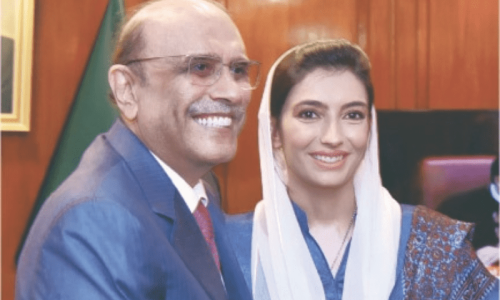ISLAMABAD, Oct 23: As the Islamabad High Court (IHC) on Tuesday directed the capital administration to hold local government (LG) elections without any further delay, the city’s top bureaucrat said he would be seeking advice from the federal government.
Talking to Dawn, Chief Commissioner Tariq Mehmood Prizada said: “The court order will be implemented in letter and spirit but without seeking directions from the federal government I cannot say anything about the polls.”
He, however, added that the government was already planning to hold the LG elections in Islamabad.
While deciding two identical petitions, Justice Noorul Haq N. Qureshi on Tuesday gave six months to the federal government to hold the elections.
The petitions were filed by Haji Salahuddin, the chairman of small traders association, and M. Kokab Iqbal Advocate. Justice Qureshi on October 9 had reserved the judgment on the petitions.
The court directed the secretary Ministry of Capital Administration and Development (CAD) and the chief commissioner to hold the elections “as early as possible but not later than six months.”
It may be recalled that the last local bodies’ elections in the federal capital were held in 1992 in which the 12 union councils had elected their representatives for four years. The union councils are Bhara Kahu, Phulgaran, Tuimer, Charah, Kirpa, Sihala, Koral, Rawat, Sohan, Tarlai, Kurri and Shah Allah Ditta.
After Islamabad was given the status of an independent district on July 1, 1980, the Local Government and Rural Development Ministry held the first polls in 1980 followed by those in 1983, 1987 and 1992 under the local government ordinance 1979.
The federal government, however, discontinued holding the elections in Islamabad in the late ‘90s and did not announce the schedule even after the promulgation of the Islamabad Capital Territory Local Government (amendment) Ordinance 2002.
During the hearing of the petitions, advocates Babar Awan and Kokab Iqbal informed the court that under article 32 of the Constitution, the respondents - secretary CAD and the chief commissioner - were duty-bound to hold the LG elections in the federal capital to meet the demands and requirements of the public.
Under sub-article (2) (B) of article 1 of the Constitution, Islamabad capital territory is an independent federating unit; therefore, all its citizens must be treated as equal before the law and entitled to equal protection of law as guaranteed under article 25 of the Constitution, they contended.
The petitions pointed out that not holding the local government elections was illegal, unlawful and discriminatory. The court was requested to issue directions to the respondents for taking steps to create the local government institution in the capital.
In its reply to the court, the chief commissioner, while acknowledging that the local government ordinance 1979 was still intact in Islamabad, sought more time to hold the elections.
The reply said under the local government ordinance, Islamabad was divided into urban and rural areas. It said the Capital Development Authority was delivering services to all the sectors, called urban areas, while the rural areas, comprising the 12 union councils, used to be run through the local bodies’ system in the past.
Because of sensitive installations, including the presidency, prime minister house and the diplomatic enclave, the urban areas were excluded from the purview of the local government ordinance 2002. The affairs of these sensitive installations cannot be given to the local bodies, the reply said.
Despite repeated notices, the federal government did not respond to the petitions. The judge remarked that Nazir Abbasi, the standing counsel for the federal government, had also not properly assisted the court in the case.
Justice Qureshi in its order observed that the Supreme Court in its judgment dated January 5, 2012, had also directed the federal and provincial governments to hold local government elections in their respective territories.
Senator Zafar Ali Shah, who was the chairman of the coordination committee of Islamabad’s 12 union councils in 1980, told Dawn that the court decision had revived the earlier local government system and the residents of Islamabad would get their elected councillors and mayors soon.
Mr Shah added that the LG system was an effective way of resolving the problems of the common man all over the world. “Due to non-existence of their elected representatives, the residents of the capital are being exploited by bureaucrats and their subordinate staff,” he added.
When contacted for comments, Syed Nayyab Hassan Gardezi, the president of Islamabad High Court Bar Association, added: “The LG system will also provide the residents an alternative forum to get their ordinary disputes resolved. Ultimately, it will reduce the workload on the civil courts as well.”














































Dear visitor, the comments section is undergoing an overhaul and will return soon.